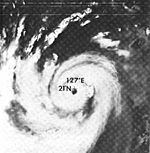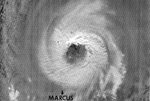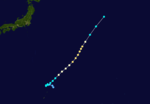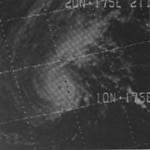1977 Pacific typhoon season
This article needs additional citations for verification. (February 2021) |
| 1977 Pacific typhoon season | |
|---|---|
 Season summary map | |
| Seasonal boundaries | |
| First system formed | January 10, 1977 |
| Last system dissipated | January 3, 1978 |
| Strongest storm | |
| Name | Babe |
| • Maximum winds | 205 km/h (125 mph) (10-minute sustained) |
| • Lowest pressure | 905 hPa (mbar) |
| Seasonal statistics | |
| Total depressions | 54 |
| Total storms | 19 |
| Typhoons | 11 |
| Super typhoons | 3 (unofficial) |
| Total fatalities | >235 |
| Total damage | > $23 million (1977 USD) |
| Related articles | |
The 1977 Pacific typhoon season was one of the least active Pacific typhoon seasons on record, with only 19 tropical storms forming. It was also the second of three known typhoon seasons during the satellite era (since 1960) to not produce a Category 5-equivalent super typhoon, sandwiched between the 1974 and 2017 seasons. The season's first storm, Severe Tropical Storm Patsy, formed on March 23 and the last, Typhoon Mary, dissipated on January 2, 1978. With Mary spanning two calendar years, it became the fourth typhoon to do so since 1945. Since then, two other typhoons have achieved this feat.
The scope of this article is limited to the Pacific Ocean, north of the equator and west of the International Date Line. Storms that form east of the date line and north of the equator are called hurricanes; see 1977 Pacific hurricane season. Tropical Storms formed in the entire west pacific basin were assigned a name by the Joint Typhoon Warning Center. Tropical depressions in this basin have the "W" suffix added to their number. Tropical depressions that enter or form in the Philippine area of responsibility are assigned a name by the Philippine Atmospheric, Geophysical and Astronomical Services Administration or PAGASA. This can often result in the same storm having two names.
Season summary[edit]

Systems[edit]
A total of 54 tropical depressions were recognized by the various warning agencies this year in the Western Pacific, of which 20 became tropical storms. Eleven storms reached typhoon intensity, of which three reached super typhoon strength.[1]
Tropical Depression Atring[edit]
| Tropical depression (PAGASA) | |
| Duration | January 10 – January 13 |
|---|---|
| Peak intensity | 55 km/h (35 mph) (10-min); |
Named by PAGASA.
Severe Tropical Storm Patsy[edit]
| Severe tropical storm (JMA) | |
| Tropical storm (SSHWS) | |
| Duration | March 23 – March 31 |
|---|---|
| Peak intensity | 95 km/h (60 mph) (10-min); 990 hPa (mbar) |
Patsy stayed clear from land.
Tropical Depression 02W (Bining)[edit]
| Tropical depression (SSHWS) | |
| Duration | May 26 – May 27 |
|---|---|
| Peak intensity | 55 km/h (35 mph) (1-min); 1000 hPa (mbar) |
2W was short-lived.
Severe Tropical Storm Ruth (Kuring)[edit]
| Severe tropical storm (JMA) | |
| Tropical storm (SSHWS) | |
| Duration | June 14 – June 17 |
|---|---|
| Peak intensity | 110 km/h (70 mph) (10-min); 975 hPa (mbar) |
Ruth hit China.
Tropical Depression 04W (Daling)[edit]
| Tropical depression (SSHWS) | |
| Duration | July 5 – July 6 |
|---|---|
| Peak intensity | 55 km/h (35 mph) (1-min); 995 hPa (mbar) |
4W hit South China.
Typhoon Sarah (Elang)[edit]
| Typhoon (JMA) | |
| Category 1 typhoon (SSHWS) | |
| Duration | July 16 – July 21 |
|---|---|
| Peak intensity | 130 km/h (80 mph) (10-min); 970 hPa (mbar) |
Sarah struck China.
Typhoon Thelma (Goring)[edit]
| Typhoon (JMA) | |
| Category 2 typhoon (SSHWS) | |
| Duration | July 21 – July 26 |
|---|---|
| Peak intensity | 130 km/h (80 mph) (10-min); 950 hPa (mbar) |
A tropical disturbance east of the Philippines organized into a tropical depression on July 21. It moved to the northwest, strengthening into a tropical storm later that day and into a typhoon on the 22nd. After passing northern Luzon and dropping heavy rains, Thelma turned to the north, where it reached a peak intensity of 95 mph winds. The typhoon hit southern Taiwan on the 25th, crossed the island, and dissipated over southeastern China on the 26th. Though not a particularly strong storm, Thelma brought strong wind gusts and heavy rain, claiming more than 30 lives and bringing damage and destruction not seen to the island for over 80 years.
Typhoon Vera (Huling)[edit]
| Violent typhoon (JMA) | |
| Category 3 typhoon (SSHWS) | |
| Duration | July 28 – August 1 |
|---|---|
| Peak intensity | 205 km/h (125 mph) (10-min); 925 hPa (mbar) |
Just 6 days after Thelma hit Taiwan, another typhoon was brewing to its east. Typhoon Vera, which developed on July 28, hit eastern Taiwan on the 31st as a 125 mph typhoon. It continued westward, and dissipated over southeastern China. The storm caused 25 additional fatalities to the island, with vast amounts of crop and property damage occurring.
Tropical Storm Wanda[edit]
| Tropical storm (JMA) | |
| Tropical storm (SSHWS) | |
| Duration | July 31 – August 4 |
|---|---|
| Peak intensity | 75 km/h (45 mph) (10-min); 985 hPa (mbar) |
Wanda stayed at sea.
Severe Tropical Storm Amy (Ibiang)[edit]
| Severe tropical storm (JMA) | |
| Tropical storm (SSHWS) | |
| Duration | August 20 – August 23 |
|---|---|
| Peak intensity | 110 km/h (70 mph) (10-min); 985 hPa (mbar) |
Amy hit Taiwan.
JMA Tropical Storm Eight[edit]
| Tropical storm (JMA) | |
| Duration | August 21 – August 22 |
|---|---|
| Peak intensity | 75 km/h (45 mph) (10-min); 988 hPa (mbar) |
This storm was short-lived.
Super Typhoon Babe (Miling)[edit]
| Violent typhoon (JMA) | |
| Category 4 super typhoon (SSHWS) | |
| Duration | September 2 – September 12 |
|---|---|
| Peak intensity | 205 km/h (125 mph) (10-min); 905 hPa (mbar) |
Developing as a tropical depression on September 2, Babe initially tracked west-northwestward as it intensified. On September 5, an abrupt shift in steering currents caused the system to turn north-northwestward. Over the following two days, Babe quickly intensified, ultimately attaining its peak intensity early on September 8 with winds of 240 km/h (150 mph) and a barometric pressure of 905 mbar (hPa; 26.72 inHg). Not long after reaching this strength, another shift in the steering patterns caused the typhoon to execute a prolonged counter-clockwise arc, causing it to track through the Ryukyu Islands, as it interacted with a low pressure originating from the Korean Peninsula. During this time, the system gradually weakened and eventually it made landfall near Shanghai, China on September 11 as a minimal typhoon before dissipating inland the following day.[2][3]
Passing through the Ryukyu Islands as a powerful typhoon, Babe caused considerable damage in the region. More than 1,000 homes were destroyed and nearly 7,000 more were damaged or flooded. One person was killed on Amami Ōshima and 77 others were injured throughout the country.[4] Total losses reached ¥6.1 billion (US$23 million).[5] Offshore, over 100 vessels were affected by the storm, including a Panamanian freighter where 13 people died.[2] In China, more than 24,000 homes were destroyed and nine people were killed.[6]
Tropical Storm Carla (Luming)[edit]
| Tropical storm (JMA) | |
| Tropical storm (SSHWS) | |
| Duration | September 3 – September 5 |
|---|---|
| Peak intensity | 65 km/h (40 mph) (10-min); 990 hPa (mbar) |
Carla hit Vietnam.
Typhoon Dinah (Openg)[edit]
| Typhoon (JMA) | |
| Category 1 typhoon (SSHWS) | |
| Duration | September 14 – September 23 |
|---|---|
| Peak intensity | 130 km/h (80 mph) (10-min); 965 hPa (mbar) |
The monsoon trough spawned a tropical storm on September 14 northeast of the northern Philippines. The previous typhoon brought the trough more northward, hence the unusually high latitude for a monsoon storm. Strong high pressure to Dinah's northwest forced the storm to the southwest, where it crossed northern Luzon on the 15th and 16th. Weak steering currents in the South China Sea allowed Dinah to drift, first then to the northeast then back to the west-southwest. Generally favorable conditions allowed Dinah to reach typhoon strength on the 19th, but a developing tropical storm to its northeast caused it to weaken. The building of the subtropical ridge forced Dinah to the southwest, where it hit southern Vietnam on the 23rd as a tropical depression. The remnants turned northward, crossed the Gulf of Tonkin, and dissipated over China on the 27th.
Dinah brought heavy rain and flooding to Luzon that killed 54 people and left 11 others missing.[7]
Tropical Depression Narsing[edit]
| Tropical depression (JMA) | |
| Tropical depression (SSHWS) | |
| Duration | September 11 – September 13 |
|---|---|
| Peak intensity | 55 km/h (35 mph) (10-min); |
The depression lasted two days.
Severe Tropical Storm Emma[edit]
| Severe tropical storm (JMA) | |
| Tropical storm (SSHWS) | |
| Duration | September 15 – September 20 |
|---|---|
| Peak intensity | 110 km/h (70 mph) (10-min); 965 hPa (mbar) |
Emma recurved from Japan.
Severe Tropical Storm Freda (Pining)[edit]
| Severe tropical storm (JMA) | |
| Tropical storm (SSHWS) | |
| Duration | September 23 – September 25 |
|---|---|
| Peak intensity | 100 km/h (65 mph) (10-min); 980 hPa (mbar) |
Tropical Storm Freda struck Hong Kong killing one person.[8]
Typhoon Gilda[edit]
| Typhoon (JMA) | |
| Category 1 typhoon (SSHWS) | |
| Duration | October 3 – October 10 |
|---|---|
| Peak intensity | 120 km/h (75 mph) (10-min); 965 hPa (mbar) |
Gilda recurved from Japan.
JMA Tropical Storm Fifteen[edit]
| Tropical storm (JMA) | |
| Duration | October 11 – October 14 |
|---|---|
| Peak intensity | 75 km/h (45 mph) (10-min); 990 hPa (mbar) |
Existed way off Japan.
Tropical Depression Rubing[edit]
| Tropical depression (JMA) | |
| Tropical depression (SSHWS) | |
| Duration | October 14 – October 16 |
|---|---|
| Peak intensity | 55 km/h (35 mph) (10-min); |
The depression was short-lived.
Tropical Storm Harriet (Saling)[edit]
| Severe tropical storm (JMA) | |
| Tropical storm (SSHWS) | |
| Duration | October 16 – October 20 |
|---|---|
| Peak intensity | 100 km/h (65 mph) (10-min); 980 hPa (mbar) |
Harriet stayed at sea.
Typhoon Ivy[edit]
| Typhoon (JMA) | |
| Category 2 typhoon (SSHWS) | |
| Duration | October 21 – October 27 |
|---|---|
| Peak intensity | 150 km/h (90 mph) (10-min); 940 hPa (mbar) |
Ivy also stayed at sea.
Typhoon Jean[edit]
| Typhoon (JMA) | |
| Category 1 typhoon (SSHWS) | |
| Duration | October 28 – November 3 |
|---|---|
| Peak intensity | 120 km/h (75 mph) (10-min); 970 hPa (mbar) |
Typhoon Jean was a tropical depression. It quickly became a tropical storm and on October 31, became a typhoon.
Tropical Depression Tasing[edit]
| Tropical depression (JMA) | |
| Tropical depression (SSHWS) | |
| Duration | November 3 – November 5 |
|---|---|
| Peak intensity | 55 km/h (35 mph) (10-min); |
This depression was short-lived.
Typhoon Kim (Unding)[edit]
| Violent typhoon (JMA) | |
| Category 4 super typhoon (SSHWS) | |
| Duration | November 6 – November 17 |
|---|---|
| Peak intensity | 205 km/h (125 mph) (10-min); 920 hPa (mbar) |
Typhoon Kim was a 150 mph super typhoon that hit the northern Philippines on November 13. The typhoon's heavy rains caused flash flooding that left 55 people dead with widespread damage. A further 47 people died when the upper floors of a hotel caught fire during the storm.
Typhoon Lucy (Walding)[edit]
| Violent typhoon (JMA) | |
| Category 4 super typhoon (SSHWS) | |
| Duration | November 28 – December 7 |
|---|---|
| Peak intensity | 205 km/h (125 mph) (10-min); 920 hPa (mbar) |
Lucy recurved from The Philippines.
Typhoon Mary (Yeyeng)[edit]
| Very strong typhoon (JMA) | |
| Category 2 typhoon (SSHWS) | |
| Duration | December 20, 1977 – January 3, 1978 |
|---|---|
| Peak intensity | 155 km/h (100 mph) (10-min); 945 hPa (mbar) |
Mary moved through the Marshall Islands.
Storm names[edit]
Western North Pacific tropical cyclones were named by the Joint Typhoon Warning Center. The first storm of 1977 was named Patsy and the final one was named Mary.
|
|
|
|
Philippines[edit]
| Atring | Bining | Kuring | Daling | Elang |
| Goring | Huling | Ibiang | Luming | Miling |
| Narsing | Openg | Pining | Rubing | Saling |
| Tasing | Unding | Walding | Yeyeng | |
| Auxiliary list | ||||
|---|---|---|---|---|
| Anding (unused) | ||||
| Binang (unused) | Kadiang (unused) | Dinang (unused) | Epang (unused) | Gundang (unused) |
The Philippine Atmospheric, Geophysical and Astronomical Services Administration uses its own naming scheme for tropical cyclones in their area of responsibility. PAGASA assigns names to tropical depressions that form within their area of responsibility and any tropical cyclone that might move into their area of responsibility. Should the list of names for a given year prove to be insufficient, names are taken from an auxiliary list, the first 6 of which are published each year before the season starts. Names not retired from this list will be used again in the 1981 season. This is the same list used for the 1973 season. PAGASA uses its own naming scheme that starts in the Filipino alphabet, with names of Filipino female names ending with "ng" (A, B, K, D, etc.). Names that were not assigned/going to use are marked in gray.
Retirement[edit]
Due to its impacts in the Philippines, PAGASA later retired the name Unding and was replaced by Unsing for the 1981 season. However, the name Unding would later be reused in the 2004 season, only for it to be re-retired by PAGASA due to its effects in Luzon.
Season effects[edit]
This table will list all the storms that developed in the northwestern Pacific Ocean west of the International Date Line and north of the equator during 1977. It will include their intensity, duration, name, areas affected, deaths, missing persons (in parentheses), and damage totals. Classification and intensity values will be based on estimations conducted by the JMA. All damage figures will be in 1977 USD. Damages and deaths from a storm will include when the storm was a precursor wave or an extratropical low.
| Name | Dates | Peak intensity | Areas affected | Damage (USD) |
Deaths | Refs | ||
|---|---|---|---|---|---|---|---|---|
| Category | Wind speed | Pressure | ||||||
| Atring | January 10–15 | Tropical depression | 55 km/h (35 mph) | 1,004 hPa (29.65 inHg) | Philippines | Unknown | None | |
| Patsy | March 27–31 | Severe tropical storm | 95 km/h (60 mph) | 990 hPa (29.23 inHg) | Marshall Islands | None | None | |
| 02W (Bining) | May 25–27 | Tropical depression | 55 km/h (35 mph) | 1,002 hPa (29.59 inHg) | None | None | None | |
| TD | May 28–30 | Tropical depression | Not specified | 1,006 hPa (29.71 inHg) | Mariana Islands | None | None | |
| TD | June 12 | Tropical depression | Not specified | 1,008 hPa (29.77 inHg) | Philippines | None | None | |
| Ruth (Kuring) | June 13–17 | Severe tropical storm | 110 km/h (70 mph) | 975 hPa (28.79 inHg) | Philippines, China, Taiwan | Unknown | Unknown | |
| TD | June 26–27 | Tropical depression | Not specified | 1,007 hPa (29.74 inHg) | None | None | None | |
| 04W (Daling) | July 3–6 | Tropical depression | 55 km/h (35 mph) | 994 hPa (29.35 inHg) | South China | None | None | |
| TD | July 4 | Tropical depression | Not specified | 1,008 hPa (29.77 inHg) | Philippines | None | None | |
| Sarah (Elang) | July 14–22 | Typhoon | 130 km/h (80 mph) | 970 hPa (28.64 inHg) | Palau, Philippines, South China, Vietnam | Unknown | Unknown | |
| TD | July 14–15 | Tropical depression | Not specified | 1,006 hPa (29.71 inHg) | Philippines | None | None | |
| TD | July 14–18 | Tropical depression | Not specified | 1,004 hPa (29.65 inHg) | Caroline Islands | None | None | |
| Thelma (Goring) | July 19–27 | Typhoon | 130 km/h (80 mph) | 950 hPa (28.05 inHg) | Philippines, Taiwan, China | Unknown | 30 | |
| Vera (Huling) | July 25 – August 2 | Typhoon | 205 km/h (125 mph) | 925 hPa (27.32 inHg) | Ryukyu Islands, Taiwan, China | Unknown | 25 | |
| Wanda | July 30 – August 7 | Tropical storm | 75 km/h (45 mph) | 985 hPa (29.09 inHg) | None | None | None | |
| TD | July 30 | Tropical depression | Not specified | 1,002 hPa (29.59 inHg) | None | None | None | |
| TD | August 10 | Tropical depression | Not specified | 996 hPa (29.41 inHg) | None | None | None | |
| TD | August 12 | Tropical depression | Not specified | 998 hPa (29.47 inHg) | Mariana Islands | None | None | |
| TD | August 13–18 | Tropical depression | Not specified | 996 hPa (29.41 inHg) | Japan | None | None | |
| TD | August 14–18 | Tropical depression | Not specified | 994 hPa (29.35 inHg) | None | None | None | |
| TD | August 14–15 | Tropical depression | Not specified | 1,004 hPa (29.65 inHg) | None | None | None | |
| Amy (Ibiang) | August 16–25 | Severe tropical storm | 110 km/h (70 mph) | 980 hPa (28.94 inHg) | Philippines, Taiwan, Ryukyu Islands, Japan | Unknown | Unknown | |
| TD | August 17–20 | Tropical depression | Not specified | 1,004 hPa (29.65 inHg) | None | None | None | |
| TD | August 20–21 | Tropical depression | Not specified | 996 hPa (29.41 inHg) | Ryukyu Islands | None | None | |
| Eight | August 21–22 | Tropical storm | 75 km/h (45 mph) | 988 hPa (29.18 inHg) | Japan | None | None | |
| TD | August 21 | Tropical depression | Not specified | 996 hPa (29.41 inHg) | Japan | None | None | |
| TD | August 27–28 | Tropical depression | Not specified | 1,000 hPa (29.53 inHg) | None | None | None | |
| Carla (Luming) | August 31 – September 6 | Tropical storm | 65 km/h (40 mph) | 990 hPa (29.23 inHg) | Philippines, Vietnam, Laos | Unknown | None | |
| Babe (Miling) | August 31 – September 12 | Typhoon | 205 km/h (125 mph) | 905 hPa (26.72 inHg) | Caroline Islands, Ryukyu Islands, East China | $23 million | 23 | |
| TD | September 7–9 | Tropical depression | Not specified | 996 hPa (29.41 inHg) | Japan | None | None | |
| TD | September 8 | Tropical depression | Not specified | 1,004 hPa (29.65 inHg) | Vietnam | None | None | |
| TD | September 10 | Tropical depression | Not specified | 1,002 hPa (29.59 inHg) | Caroline Islands | None | None | |
| Dinah (Openg) | September 11–26 | Typhoon | 130 km/h (80 mph) | 965 hPa (28.50 inHg) | Philippines, Vietnam, Laos, Cambodia | Unknown | 54 | |
| TD | September 11–12 | Tropical depression | Not specified | 1,004 hPa (29.65 inHg) | None | None | None | |
| TD | September 11–12 | Tropical depression | Not specified | 1,002 hPa (29.59 inHg) | Caroline Islands | None | None | |
| Emma | September 12–21 | Severe tropical storm | 110 km/h (70 mph) | 965 hPa (28.50 inHg) | Mariana Islands, Japan | None | None | |
| Narsing | September 12–13 | Tropical depression | 45 km/h (30 mph) | 1,002 hPa (29.59 inHg) | Philippines | None | None | |
| Freda (Pining) | September 21–25 | Severe tropical storm | 100 km/h (60 mph) | 980 hPa (28.94 inHg) | Philippines, South China | None | 1 | |
| TD | September 26–29 | Tropical depression | Not specified | 1,008 hPa (29.77 inHg) | Ryukyu Islands | None | None | |
| TD | September 29 | Tropical depression | Not specified | 1,008 hPa (29.77 inHg) | None | None | None | |
| Gilda | October 3–9 | Typhoon | 120 km/h (75 mph) | 965 hPa (28.50 inHg) | None | None | Nonr | |
| TD | October 8 | Tropical depression | Not specified | 1,008 hPa (29.77 inHg) | None | None | None | |
| Fifteen | October 11–13 | Tropical storm | 75 km/h (45 mph) | 990 hPa (29.23 inHg) | Japan | None | None | |
| Rubing | October 11–15 | Tropical depression | 55 km/h (35 mph) | 1,004 hPa (29.65 inHg) | Mariana Islands | None | None | |
| Harriet (Saling) | October 14–20 | Severe tropical storm | 100 km/h (60 mph) | 980 hPa (28.94 inHg) | None | None | None | |
| Ivy | October 18–27 | Typhoon | 150 km/h (95 mph) | 950 hPa (28.05 inHg) | Mariana Islands | None | None | |
| Jean | October 28 – November 5 | Typhoon | 120 km/h (75 mph) | 970 hPa (28.64 inHg) | None | None | None | |
| TD | October 30–31 | Tropical depression | Not specified | 1,008 hPa (29.77 inHg) | None | None | None | |
| Tasing | November 3–5 | Tropical depression | 45 km/h (30 mph) | 1,008 hPa (29.77 inHg) | None | Unknown | Unknown | |
| Kim (Unding) | November 4–17 | Typhoon | 120 km/h (75 mph) | 920 hPa (27.17 inHg) | Mariana Islands, Philippines | Unknown | 102 | |
| TD | November 15–17 | Tropical depression | Not specified | 1,006 hPa (29.71 inHg) | None | None | None | |
| TD | November 24 | Tropical depression | Not specified | 1,010 hPa (29.83 inHg) | Philippines | None | None | |
| Lucy (Walding) | November 28 – December 9 | Typhoon | 205 km/h (125 mph) | 920 hPa (27.17 inHg) | Caroline Islands | None | None | |
| Mary (Yeyeng) | December 18, 1977 – January 3, 1978 | Typhoon | 155 km/h (95 mph) | 945 hPa (27.91 inHg) | Marshall Islands, Caroline Islands, Philippines | Unknown | Unknown | |
| Season aggregates | ||||||||
| 54 systems | January 10, 1977 – January 3 1978 | 205 km/h (125 mph) | 905 hPa (26.72 inHg) | >$23 million | >235 | |||
See also[edit]
- List of Pacific typhoon seasons
- 1977 Pacific hurricane season
- 1977 Atlantic hurricane season
- 1977 North Indian Ocean cyclone season
- South-West Indian Ocean cyclone seasons: 1976–77, 1977–78
- Australian region cyclone seasons: 1976–77, 1977–78
- South Pacific cyclone seasons: 1976–77, 1977–78
References[edit]
- ^ 1977 ATCR TABLE OF CONTENTS Archived 2011-06-06 at the Wayback Machine
- ^ a b "Annual Tropical Cyclone Report: Typhoon Babe" (PDF). Joint Typhoon Warning Center. United States Navy. 1978. pp. 27–29. Archived from the original (PDF) on September 25, 2018. Retrieved April 17, 2013.
- ^ "1977 Babe (1977243N05156)". International Best Track Archive. 2013. Retrieved April 17, 2013.[permanent dead link]
- ^ "Typhoon Rakes Japan". The Spokesman-Review. Tokyo, Japan. Associated Press. September 11, 1977. p. A5. Retrieved April 17, 2013.
- ^ "台風197709号 (Babe) [沖永良部台風] – 災害情報". Digital Typhoon (in Japanese). National Institute of Informatics. 2013. Retrieved April 17, 2013.
- ^ Yongqiang Zong and Xiqing Chen (March 1999). "Typhoon Hazards in the Shanghai Area". Disasters. 23 (1): 66–80. doi:10.1111/1467-7717.00105. PMID 10204288. (subscription required)
- ^ "Destructive Typhoons 1970-2003". National Disaster Coordinating Council. November 9, 2004. Archived from the original on November 9, 2004. Retrieved April 22, 2013.
- ^ "Historical Information". Archived from the original on 2015-05-16. Retrieved 2007-12-17.
External links[edit]
- Japan Meteorological Agency
- Joint Typhoon Warning Center Archived 2010-03-01 at the Wayback Machine.
- China Meteorological Agency
- National Weather Service Guam
- Hong Kong Observatory
- Macau Meteorological Geophysical Services
- Korea Meteorological Agency
- Philippine Atmospheric, Geophysical and Astronomical Services Administration
- Taiwan Central Weather Bureau
- Digital Typhoon - Typhoon Images and Information
- Typhoon2000 Philippine typhoon website





































